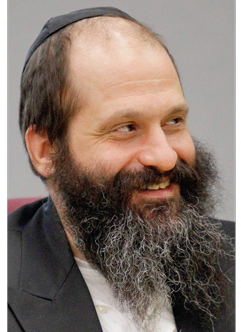People who have been following the saga of Sholom Mordechai Rubashkin were heartened when two respected legal scholars called on President Barack Obama this week to pardon Sholom Mordechai, who is currently serving a 27-year prison sentence.
Charles Renfrew and James Reynolds, writing in the Wall Street Journal, stated that the sentence being served by the former CEO of Agriprocessors in Postville, Iowa, is more than twice as long as he would have served had his punishment fit his crime.
Renfrew, a U.S. District Court judge in the Northern District of California (1972-80) and U.S. deputy attorney general (1980-81), and Reynolds, the U.S. attorney for the Northern District of Iowa (1976-82), briefly mention the background of the Rubashkin case, starting on May 12, 2008, when U.S. Immigration and Customs Enforcement agents raided the Agriprocessors plant and arrested hundreds of the firm’s workers, undocumented immigrants, leading the company to file for bankruptcy several months later.
“Although Mr. Rubashkin was convicted, he did not intend to cause any loss to the bank,” Renfrew and Reynolds point out. “But the federal prosecutors who charged him wanted to extract a pound of flesh, and then some – even at the cost of illegally overstepping their bounds and interfering in the bankrupt company’s sale.”
Evidence that the prosecutors hid and that Rubashkin attorneys found over the past few years, the op-ed says, proves that the prosecutors “stymied the bankruptcy trustee from making a sale to prospective buyers at a reasonable price,” instead warning “that buyers would forfeit the business if any member of the Rubashkin family maintained a connection to the firm.”
Nine prospective bidders – including one offer of $40 million – subsequently walked away from the sale and Agriprocessors was sold for a mere $8.5 million, ensuring that the bank would not get back the money it was owed.
A bank fraud offender’s sentence is linked to the loss incurred by the bank. In Rubashkin’s case, due to the prosecutors’ meddling, the loss was $27 million, allowing the prosecutors to request a life sentence. This was later lowered to 27 years in prison.
Renfrew and Reynolds state that the prosecutors concealed their role “by soliciting false testimony from Paula Roby, counsel for the bankruptcy trustee, who said that the prosecutors did not interfere in the bankruptcy sale process. At sentencing, the prosecutors misled the court into believing this meddling never happened, a fact that was only recently discovered.”
After the 2010 conviction, but prior to sentencing, a bipartisan group of six former attorneys general and over a dozen other prominent legal experts wrote a letter to the judge asking her to show leniency. This call, Renfrew and Reynolds share, has “grown into a clamor” in the last six years. Just this past April, a bipartisan group of four former U.S. attorneys general, two former FBI directors and dozens of law professors and former Justice Department officials wrote to the current U.S. Attorney for the Northern District of Iowa, Kevin Techau, describing the sentence as “patently unjust” and asking him to address what the letter called “shocking new evidence that prosecutors in your office knowingly presented false and misleading testimony at the sentencing hearing.”
Renfrew and Reynolds stated in their op-ed that every day that Rubashkin spends in prison “is a day that he should be spending as a free man, with his family.”
“That is why we urge President Obama to pardon Mr. Rubashkin before he leaves office in January,” they wrote.
California attorney Gary Apfel, an erstwhile advocate for Rubashkin and head of his legal team, told the Yated in an interview on Tuesday that for two such eminent jurists to speak out on this matter evidences just how great an injustice has been perpetrated.
“We are very grateful to Judge Renfrew and Mr. Reynolds for voicing their opinion,” said Apfel. “It is gratifying that the mainstream press has finally recognized the magnitude of this injustice and that such an influential newspaper as the Wall Street Journal would publish this op-ed.
“We hope,” added Apfel, “that this spotlight will lead to the Justice Department and the president taking appropriate action and pardoning Sholom Mordechai.”








